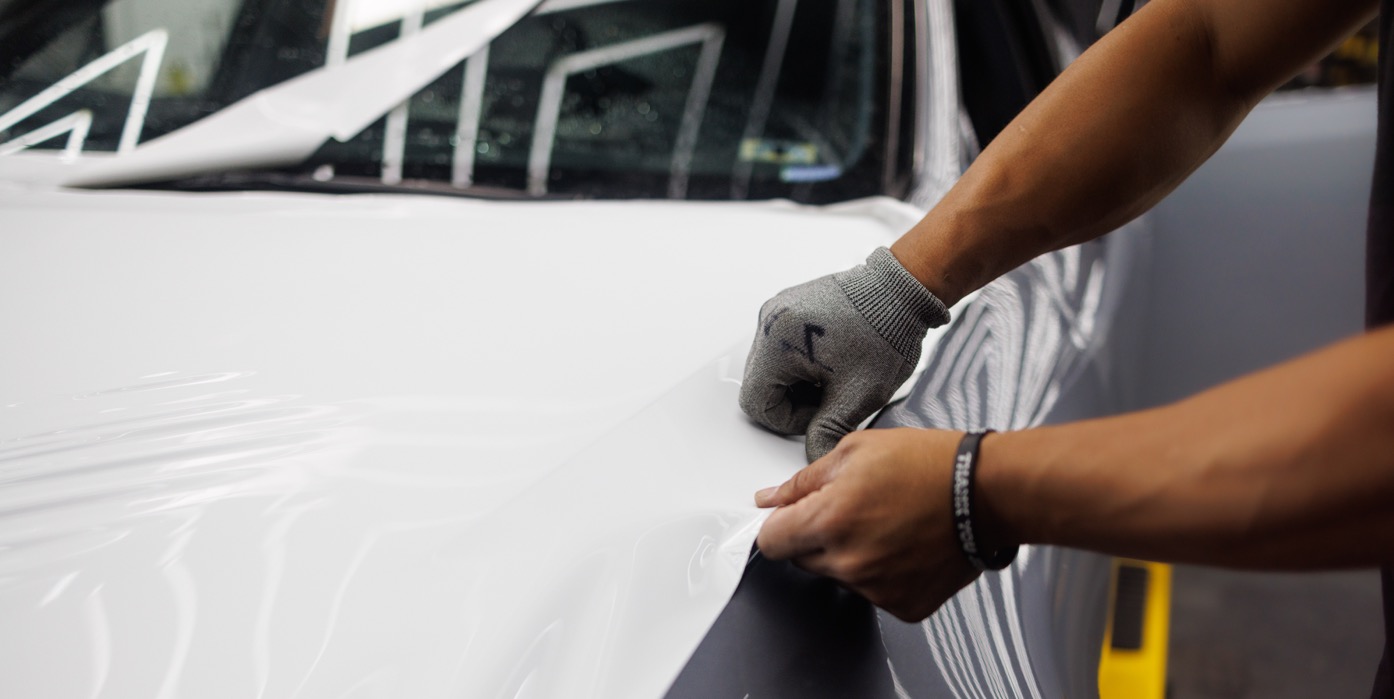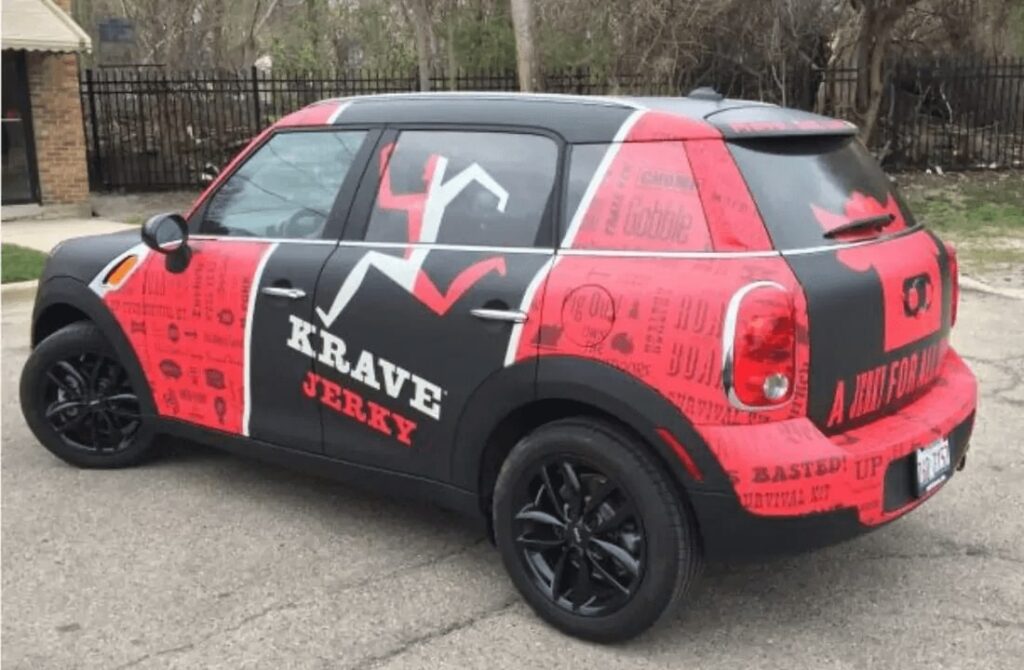You’ve seen them on the road before: cars, trucks, and buses with colorful, eye-catching designs plastered across their exteriors. These are called vehicle wraps, and they’re a popular way to add some personality and branding to your company vehicle or fleet. But how do they work? And how do you choose the right vinyl film for your needs?

If you’re looking for a truck wrapping company in NYC or a commercial truck wrapping company in the NJ area, it’s important to know the differences between the various vinyl films on the market. As a vehicle wrap provider, we know that choosing the right vinyl film is crucial. In this article, we’ll explore the world of vehicle wraps and dive into the differences between calendered and cast vinyl films. By the end, you’ll have a good understanding of which type is best for your needs and budget and the pros and cons of each. So let’s get started!
The Basics: Cast vs. Calendered Vinyl
First things first: what exactly is a vinyl film, and how is it made? Both calendered and cast vinyl films are made from polyvinyl chloride (PVC) polymer, a synthetic material that is durable, flexible, and resistant to water, UV light, and other external factors. But the similarities pretty much end there. Let’s take a closer look at the two types of vinyl films and how they’re made.
Cast Vinyl
Cast vinyl films are made through a casting process that involves pouring a liquid mixture of PVC polymer and other ingredients onto a moving matrix and heating it to evaporate solvents. This leaves behind a solid film that is thin, stretchy, and conformable.
One key factor that sets cast vinyl apart is the type of plasticizer used in the manufacturing process. Plasticizers are chemicals that are added to PVC to make it more flexible and pliable. There are two main types of plasticizers: polymeric and monomeric. Polymeric plasticizers are higher grade and provide better performance, while monomeric plasticizers are economy grade and may result in a less durable film.
Other additives, such as dyes, pigments, and UV and heat stabilizers, can also affect the properties of the film. Brands such as Avery SW900 and 3M 1080 are popular choices for cast vinyl films.

Pros and Cons of Cast Vinyl
When it comes to vehicle wraps, cast vinyl is often the preferred choice due to its superior performance and durability. Here are the key pros and cons of using cast vinyl for your wrap project:
| Pros | Cons |
| Highly conformable and flexible | Higher cost compared to calendered vinyl |
| Ideal for complex surfaces and curves | Requires more installation skill |
| Long-lasting (7-10 years outdoor) | Can be more difficult to remove (in rare cases) |
| Maintains color and finish over time | Longer production process |
| Less prone to shrinking and lifting | Not cost-effective for short-term projects |
| Lightweight and thin (typically ~2 mil) | |
| Suitable for full vehicle wraps | |
| Easier to remove after long-term use |
Calendered Vinyl
On the other hand, Calendered vinyl films are made by rolling and heat-pressing solid PVC material through a series of rollers to flatten and shape it into a film. This process, called “calendering”, results in a thicker and less expensive film that is not as stretchy or conformable as cast vinyl.
Calendered vinyl films are typically 2.5 mils to 4 mils thick, while cast vinyl films are usually around 2 mils thick. Calendered vinyl films are best for flat, simple surfaces, while cast vinyl films are more suitable for complex surfaces with curves and contours. Popular calendered film brands include ORACAL 651 and Avery Dennison MPI 1105 Supercast.

Pros and Cons of Calendered Vinyl
Calendered vinyl films are a popular choice for short-term or temporary wrap projects due to their lower cost and ease of installation. Here are some of the key pros and cons of using calendered vinyl for your wrap project:
| Pros | Cons |
| Lower cost than cast vinyl | Less conformable – struggles with curves and recesses |
| Thicker and easier for beginners to handle | Shorter lifespan (1-5 years outdoor durability) |
| Great for flat and simple surfaces | Prone to shrinking and lifting at the edges |
| Wide variety of colors and finishes available | More likely to fade, crack, or become brittle over time |
| Good for indoor and temporary applications | Not recommended for full vehicle wraps |
| Quick production process | Can be harder to remove after extended use |
The Bottom Line: Which is Best for Your Project?
So, which type of vinyl is best for your vehicle wrap project? Here are a few factors to consider:
Cost
Calendered vinyl is generally less expensive than cast vinyl, so if cost is a major concern, calendered vinyl may be the way to go. Keep in mind, however, that you get what you pay for. A lower-cost vinyl may not have the same performance and durability as a higher-grade film.
Durability
If you need a vinyl film that will last for an extended period of time, such as a full vinyl truck wrap, cast vinyl is the way to go. It has a longer lifespan and is more resistant to weather and UV light than calendered vinyl.
Conformability
If you’re wrapping a vehicle with complex curves and contours, such as a box truck, cast vinyl is the better choice due to its stretchiness and conformability. Calendered vinyl may wrinkle or bubble when applied to these types of surfaces.
Type of Wrap
Consider the specific needs of your wrap project. Is it a long-term wrap that will be on the road for several years, or a short-term wrap for an event or trade show? This will help you determine whether to go with cast or calendered vinyl.
Wrapping Things Up!
In summary, calendered and cast vinyl films are made from PVC polymer and used for vehicle wraps and other types of graphics. They’re quite different in terms of cost, durability, conformability, and suitability for different types of projects.
Cast vinyl is thinner, more long-lasting, and better for complex surfaces, while calendered vinyl is thicker, less expensive, and better for flat, simple surfaces. When choosing between the two, consider your budget, the lifespan of the wrap, the surface’s complexity, and your project’s specific needs.
No matter the type of vinyl you choose, it’s important to work with a professional wrap company with experience and expertise in the field. They will be able to advise you on the best vinyl film for your project and ensure that it is applied correctly for optimal performance and longevity. So if you’re in the NYC or NJ area, make sure to find a reputable and experienced company for your vinyl truck wrap or box truck wrapping services.